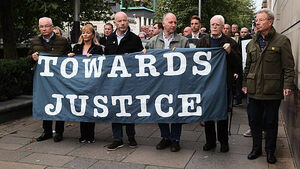Before Israel’s jets attacked the Hezbollah stronghold, thousands of residents in Beirut’s densely populated southern suburbs spent the night camped out in streets, public squares, and makeshift shelters, according to alarabiya.
Rihab Naseef, 56, of south Beirut, who spent the night in a church yard, said, “I thought the war would only target military targets, not homes, schools, or civilians.” He said, “I anticipated the war to worsen.” “I did not even pack any clothes; I never thought we would leave like this and end up on the streets,” Naseef said.
“I never imagined we would leave like this and find ourselves on the streets; I did not even pack any clothes,” Naseef remarked.
Israeli jets pounded Beirut’s south and its outskirts throughout the night, and Beirut woke up to the aftermath of a night at war, smoke billowing from blazes in several places.
“I am nervous and afraid of what might occur. I left my house not knowing where I was going, what was going to happen to me, or if I would come back,” Naseef remarked.
The extent of the destruction and the number of casualties remained unknown early on Saturday, even after a night of intense strikes.
Hezbollah’s Al-Manar television aired a film from southern Beirut that showed destroyed buildings, blocked streets with debris, and clouds of smoke and dust hovering over the Dahiyeh neighborhood.
Israel claimed on Friday to have attacked the weapons and headquarters of Hezbollah in south Beirut.
Israel declared on Friday that it had attacked Hezbollah’s weapons and south Beirut headquarters.
Israel declared on Friday that it had attacked Hezbollah’s arsenal and the organization’s headquarters in south Beirut.
The main public square in Beirut, Martyrs’ Square, was crowded with worried and tired families camped out in the open.
Hala Ezzedine, 55, who slept in the square after escaping the Burj al-Barajneh neighborhood in Dahiyeh, where strikes were taking place, expressed her anger, saying, “The bombing intensified at night and our house started shaking.”
She questioned, “What did the (Lebanese people) do to deserve this?” mentioning that Israeli strikes during the 2006 war had destroyed her home.
After almost a year of cross-border violence between Israel and Hezbollah, which claims to be acting in support of its ally Hamas in Gaza, she remarked, “They want to wage war but what wrong did we do?”
According to the health ministry there, Israel’s campaign against the Palestinian territory run by Hamas has resulted in over 41,500 deaths. Ezzedine said, “We do not have to go through what happened in Gaza.”
Israel’s military offensive was a reaction to Hamas’s October 7 attack, which claimed 1,205 Israeli lives, the majority of them civilians, according to an AFP count based on Israeli official figures that also included hostages who died while in captivity.
1,205 Israelis lost their lives in the October 7 attack, the majority of them civilians, according to an AFP tally based on Israeli official figures that also included hostages who died while in captivity. Israel began its military offensive as a result of this.
He said, “We are patient, but we should not have to cover this expense on our own.”
Hawra al-Husseini, 21, described spending a “very difficult night” in Martyrs’ Square with her family after they managed to flee Dahiyeh.
“Over our house, missiles were raining down.” The woman told AFP that she would always carry the children’s cries with her.
The woman promised to always carry the children’s cries with her, as she told AFP.





